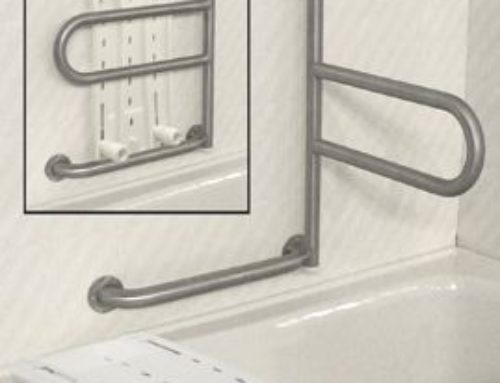It’s that time again – bath time. You face this caregiving task with dread because your dad puts up such a fuss with it. A person who is struggling with the symptoms and effects of Alzheimer’s Disease or dementia may resist showering or bathing. You may wonder, “Why is this so hard?” Well, there are numerous factors that play into this resistance, so let’s walk through it together.
Dementia affects the memory, and although you know that your dad hasn’t had a shower in two days, he may not recall this information. That part of the brain has been affected by the disease, so he will not have the recall that he once did. Try to ignore the argument that sometimes occurs. Answering his exclamations that he already took a shower and insisting that he take one will only increase his agitation.
Showering can bring up a lot of fears with someone who is struggling with the effects of Alzheimer’s Disease or dementia. The fear of falling, being cold and vulnerable are a few. Additionally, the feel of the cold air on the unclothed skin and sometimes the embarrassment of being unclothed in front of their adult child can add to the resistance. Even the feel of the water on the skin can be terrifying.
Think how a baby reacts to his or her first bath – they usually cry, right? But once they get used to it, they usually enjoy it. That’s because the sensation of the cold air and the water is foreign to them at first, but then it becomes a learned memory that bath time is fun, warm and pleasant. For someone with Alzheimer’s Disease or dementia, their brain may have forgotten those formed memories and so now each bathing experience is like starting all over again.
The time of day when you schedule the bathing depends on what your dad is used to. If he usually winds down the day with bathing, then continue with that routine. If he enjoyed his shower in the morning, then that may be the best time to do it. However, remember that dementia makes things change so what may have worked yesterday may not work today. Be flexible and open to those changes.
Make sure you’re bathing him when you have time. A person trying to manage the symptoms of Alzheimer’s Disease or dementia cannot be rushed, so you need to make sure you prepare ahead with plenty of time.
Make the shower time more like a spa experience. You may want to start calling it “spa” time instead of “shower” or “bath” time. Make it like a spa! Lower the lights and infuse Lavender essential oil in an oil diffuser about 5 minutes before you enter the bathroom with him. Have everything all laid out – towels, soap, washcloth. Make sure a sturdy shower chair is already in the shower with a towel on the seat. A towel helps eliminate the feel of a cold seat on the skin and will give him the reassurance of more security. The towel can also be used to preserve his dignity while you are bathing him so he can cover areas that he does not want exposed. Draping a warm towel around the shoulders can also be comforting and you can lift it as you cleanse.
Install a hand-held shower hose so that you can control the amount of water and pressure and eliminate the feel of water coming out of an overhead shower. Make sure the water is warm, and soft coming out of the shower head. To people with Alzheimer’s Disease or dementia, the sting of the water can feel painful and the sound of running water can be frightening. Using a hand-held shower hose will also enable him to “help” you and be part of the process.
Try using all-in-one products. There are many out there that are a body wash, shampoo and conditioner all in one. It eliminates the additional steps and scents. A person with dementia has difficulty sequencing or following steps, and that includes the brain following “scents”. Many scents all at once can overpower the senses and make it difficult for the person to process them. Try to find a product with a Lavender scent, which tends to be relaxing. One product, one scent can sometimes make a difference.
Let your dad do as much as possible during the bathing. Put the soap in his hand and say, “this is soap for your face, put it here” and direct him. Try hand over hand to guide him if he’s having difficulty remembering. The hand over hand technique guides him and helps the brain to recall the activity.
When washing his hair, avoid spraying water on your dad’s head. Try wetting the hair with a washcloth, washing the hair gently with the shampoo, and then “rinsing” with a wet washcloth, gently wiping front to back from the forehead. The mere motion of doing it this way is more soothing, and there is less risk of getting soap or water in the eyes, which can cause more anxiety and resistance.
Play favorite music while bathing your dad and sing together. Singing and music activates the part of the brain that helps with recalling an activity. Do a little dance for him to make him laugh!
Purchase a towel warmer and have a couple of them warming before he gets out. The warm towel is more comforting than a cold one. Place one around his shoulders while you use the other to dry him off while he is still seated. Dress him while he is seated to eliminate the fear of falling.
If you are applying lotion to his skin after bathing, use a lotion warmer so that the cold lotion doesn’t startle him. If you don’t have a warmer, then rub it in your hands a few times to warm it up before you apply it to his skin. If you use powder, shake it in his hand and help him apply it.
Throughout the entire bathing time, speak with your dad and tell him what you are doing so he knows what to expect. Maintain eye contact with him as much as possible. This helps instill trust.
We hope that the above suggestions help you. Remember that the person with Alzheimer’s Disease or dementia is doing the best that they can. They require patience, love, and a guiding hand.
Our agency services on Long Island and our companions and licensed aides are trained in the special caregiving aspects for people living with Alzheimer’s Disease or dementia related diseases. We truly understand the challenges of caregiving and would be honored to care for your loved one.
Elder Home Care provides trusted home care services to seniors living on Long Island. As your loved one ages, it is beneficial for them to keep their minds active, sharp and alert by exercising the brain. Our caregivers can assist with favorite hobbies, showering, dressing, running errands, preparing favorite meals, medication supervision, encouraging exercise and proper nutrition. It is also important for seniors to keep their spirits high. We are committed to providing the highest level of care for a wide range of needs. Most importantly, we are here to help and to provide the care your loved one deserves. Reach us at 516-494-3379 or visit our website at https://www.ehcus.com/.





